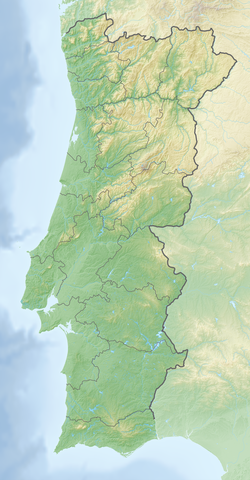Papo Seco Formation
| Papo Seco Formation | |
|---|---|
| Stratigraphic range: Early Barremian ~ | |
| Type | Geological formation |
| Underlies | Assises à Orbitolines Formation |
| Overlies | Porto da Calada Formation |
| Lithology | |
| Primary | Mudstone, siltstone |
| Other | Sandstone |
| Location | |
| Coordinates | 38°24′N 9°12′W / 38.4°N 9.2°W |
| Approximate paleocoordinates | 31°48′N 1°18′E / 31.8°N 1.3°E |
| Region | Setubal |
| Country | |
| Extent | Lusitanian Basin |
The Papo Seco Formation is a geological formation in Portugal, whose strata date back to the Early Cretaceous.[1] Dinosaur fossils are among the fossils that have been recovered from the formation.[2][3]
Name
[edit]The unit was previously referred to as the "Gres a Dinosauriens", due to the abundant dinosaur remains found in the past.[4]
Description
[edit]The Papo Seco Formation (Rey, 1992) marks the return to clastic-dominated sedimentation. Exposure of the formation is found above the low cliff between Rochadouro and Areia do Mastro, and on the foreshore and beach at Boca do Chapim. The Papo Seco Formation is dominated by silty mud-mud deposition. This is interbedded with medium to coarse, commonly ribbon shaped, clastic sandstones. Along the exposure, between Rochadouro and Boca do Chapim, the clastic sands are not laterally continuous. The exposure clearly shows that the ribbon sands are isolated and change laterally into muds. Three distinct sand facies have been identified within the Papo Seco Formation.[4]
Vertebrate paleofauna
[edit]| Dinosaurs of the Papo Seco Formation | ||||
|---|---|---|---|---|
| Genus | Species | Presence | Notes | Images |
| Dromaeosauridae indet.[5] | Indeterminate | Praia do Areia do Mastro | ||
| Iberospinus | I. natarioi[6] | Praia de Aguncheiras | Was once thought to be a specimen of Baryonyx.[1] |  |
| Suchosaurus[2] | S. girardi[2] | Boca do Chapim | Was considered a species of Baryonyx | |
| Titanosauriformes indet.[2] | Indeterminate | Boca do Chapim | Was referred to "Pleurocoelus" valdensis[2] | |
| Theropoda indet.[2] | Indeterminate[2] | Boca do Chapim | Including Megalosaurus superbus, now known as Erectopus"[2] | |
| Theropoda indet.[5] | Indeterminate | Praia do Areia do Mastro | ||
| Ornithopoda[7] | Indeterminate |
|
Previous supposed reports of Mantellisaurus and Iguanodon cannot be substantiated[7] | |
| Iguanodontia[7] | ||||
| cf. Styracosterna[7] | ||||
Correlation
[edit]
See also
[edit]References
[edit]- ^ a b Mateus, Octávio; Araújo, Ricardo; Natário, Carlos; Castanhinha, Rui (21 April 2011). "A new specimen of the theropod dinosaur Baryonyx from the early Cretaceous of Portugal and taxonomic validity of Suchosaurus". Zootaxa. 2827 (1): 54–68. doi:10.11646/zootaxa.2827.1.3. ISSN 1175-5334.
- ^ a b c d e f g h Weishampel et al., 2004, p.562
- ^ Papo Seco Formation at Fossilworks.org
- ^ a b Aillud, 2001, p.211
- ^ a b "Areias do Mastro's Quarry". The Paleobiology Database.
- ^ Mateus, Octávio; Estraviz-López, Darío (16 February 2022). "A new theropod dinosaur from the early cretaceous (Barremian) of Cabo Espichel, Portugal: Implications for spinosaurid evolution". PLOS ONE. 17 (2): e0262614. Bibcode:2022PLoSO..1762614M. doi:10.1371/journal.pone.0262614. ISSN 1932-6203. PMC 8849621. PMID 35171930.
- ^ a b c d Domingues Figueiredo, Silvério; Carvalho, Ismar de Souza; Pereda-Suberbiola, Xabier; Proença Cunha, Pedro; Bachtsevanidou Strantzali, Ioanna; Antunes, Vanessa (2022-11-06). "Ornithopod dinosaur remains from the Papo Seco Formation (lower Barremian, Lusitanian Basin, Portugal): a review of old and new finds". Historical Biology. 35 (11): 2181–2192. doi:10.1080/08912963.2022.2138372. ISSN 0891-2963.
Further reading
[edit]- S. Figueiredo, I. Bachtsevanidou Strantzali, M. Gomes, R. Pimenta, and M. Santos. 2017. Preliminary Data of New Dinosaurs and Turtles Remains from the basal Deposits of the Papo-Seco Formation in Areias do Mastro's Quarry (Cabo Espichel - Portugal). Arnava 6(1):117-130




